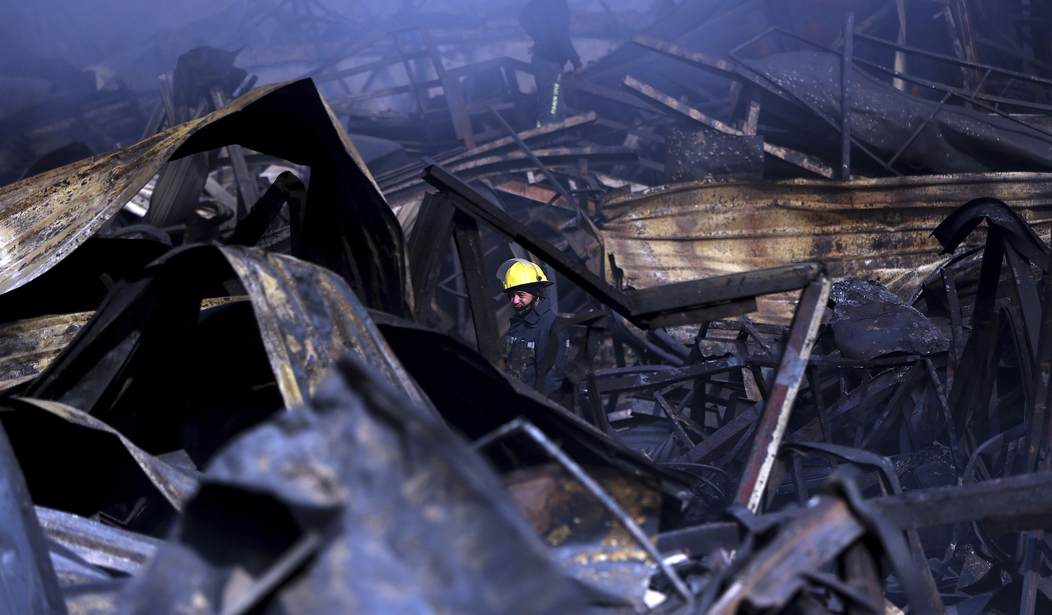At this pace, the Taliban might seize all of Afghanistan in time for the 20th anniversary of 9/11. The central government’s control appears to be collapsing at an ever-faster rate even in parts of the country where Pashtuns have less control. The capitals of three provinces fell yesterday, all of which are in the northern part of the country where resistance to the Taliban might have been expected to be firmer:
Taliban fighters overran three major cities in the north of Afghanistan on Sunday, the most significant territorial gains the militants have netted in a single day since the withdrawal of U.S. forces entered its final phase this year.
In nearly simultaneous operations, the Taliban pushed into the center of Kunduz city and the capitals of Sar-e Pol and Takhar provinces. Afghan officials said clashes were continuing in Kunduz, and a major military operation was planned to retake the strategically important city that the militants had besieged for months.
The developments marked a sharp escalation in the pace of Taliban gains across Afghanistan. For months, Taliban fighters focused on taking control of districts and increasing pressure on urban areas, but that changed Friday when they overran a provincial capital for the first time since the withdrawal of foreign forces. The militants took a second city on Saturday, and by Sunday government-held territory in the north appeared to be collapsing quickly.
The cities have been abandoned by civic and military officials alike, who are fleeing to nearby military bases. In Kunduz, they only have one base to use, which will make the Taliban’s job easier when they get around to assaulting it. The Taliban forces have focused first on prisons, where their fighters and sympathizers have been kept, so that they can add to their marauding armies. Those forces helped them seize Kunduz City’s government sector in the sack of the provincial capital.
This has a brutal mathematic all its own. The more of these prisons they find, the more the Taliban army swells, and the further they can reach. Afghan officials have tried to secure prisons in order to prevent this popular recruitment, but the results speak for themselves. While the most high-profile prisoners have been transferred to Kabul, the rest are about to get freed — which will give the Taliban an enormous advantage against an already-demoralized central-government military. It’s an exponential progression, especially when adding in those who see the writing on the wall for Kabul and want to get on the winning side rather than face later retribution from a triumphant Taliban.
What about Kabul’s erstwhile ally, the US? The New York Times paints a grim picture about the prospects of any significant assistance from the Biden administration:
If the Taliban had seized three provincial capitals in northern Afghanistan a year ago, like they did on Sunday, the American response would most likely have been ferocious. Fighter jets and helicopter gunships would have responded in force, beating back the Islamist group or, at the very least, stalling its advance.
But these are different times. What aircraft the U.S. military could muster from hundreds of miles away struck a cache of weapons far from Kunduz, Taliqan or Sar-i-Pul, the cities that already had been all but lost to the Taliban.
The muted American response on Sunday showed in no uncertain terms that America’s 20-year war in Afghanistan is over. The mismanaged and exhausted Afghan forces will have to retake the cities on their own, or leave them to the Taliban for good.
The recent string of Taliban military victories has not moved President Biden to reassess his decision to end the U.S. combat mission by the end of the month, senior administration officials said Sunday. But the violence shows just how difficult it will be for Mr. Biden to extract America from the war while insisting that he is not abandoning the country in the middle of a brutal Taliban offensive.
The NYT quotes former defense secretary Leon Panetta as saying, “The most you can hope for now is some kind of stalemate” between the Taliban and the Afghan military. Er … no, you really can’t. Right now, the best we can hope to see is Kabul remaining a besieged city-state surrounded by a country controlled by the Taliban. Given the momentum of the Pashtuns even in nominally non-Pashtun territory, the best we can hope is for a Northern Alliance to rise up in the short run to offer even some sort of counterweight-by-warlord situation.
Even that looks pretty doubtful at the moment. Maybe that will come later when the Uzbeks, Tajiks, and Turkmen chafe under Pashtun dictatorship as they did in the post-Soviet period. They’re awfully quiet at the moment, however, which bodes ill for Kabul’s survival as a city-state for more than a few months. Everyone with the means to do so will flee, and the big question is who will be around to take the picture of the ladder falling away from the last helicopter from the US embassy.
This collapse demonstrates the futility of American nation-building over the last twenty years. That doesn’t lessen the humiliation of this collapse, however, or erase the black mark in history over those who presided over it.








Join the conversation as a VIP Member